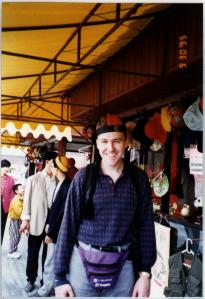

Upon my arrival in Beijing, I began trying to contact the people whose names I had been given. This proved to be more difficult than I had expected due to my limited ability to speak Chinese. I knew that my limited Chinese language skills would make communication difficult, but I (foolishly) expected English-speaking people to be more plentiful than what I actually found in Beijing and Shanghai. For example, many of the people I wanted to contact could only be reached through pagers, and as a rule the paging service operators speak no English (paging services are not automated in China as they are here). In retrospect, I think most of the people who had assured me "most young people in China can speak English" were themselves native speakers of Chinese, and thus didn't test these claims as thoroughly as I did. Luckily, I had some English-speaking acquaintances in Beijing who were able to assist me.
My attempts to arrange a meeting with Cui Jian ultimately proved fruitless. I spoke with his manager on several occasions, and learned that Cui Jian has been forbidden to have concerts in Beijing. Apparently some of his songs angered the government (no surprise), and this is their way of silencing him. He was scheduled to play a concert in a few weeks in the city of Hunan, and thus was too busy preparing for this to have time to meet with me. The concert date was not yet finalized, either, so I couldn't adjust my travel arrangements to allow me to hear him play in Hunan. Other people I talked to during my stay in Beijing warned me that Cui Jian probably wouldn't be willing to spend time with me, and would refuse to speak English with me even if I did meet him, so I didn't push for a meeting too much.
One of my acquaintances in China, Hu Xiao, actually lived outside
of Beijing but worked in the southern end of the city for a
Beijing television station. She did not know a great deal about
the rock music situation in China, but felt that most young
people didn't like such "angry" music anyway. She told me that
Beijing television stations are not allowed to show rock
music videos or rock musicians. This is apparently an unwritten
rule that "everybody" understands and follows. She also felt
that due to the fact that not many Chinese are interested in rock
music, it is fairly easy for the government to suppress it.
My first breakthrough came almost a week into my Beijing stay
when another friend introduced me to a fantastic publication
called "Beijing Scene". This English-language newspaper is
targeted at the large foreigner community that lives in the
diplomatic sections of Beijing. It proved to be extremely useful
in my search for music, as it had listings of current events,
addresses and phone numbers for local nightclubs, and even a few
articles that were relevant to my search. Coincidentally, the
August issue (there was no September issue, so August was the
most recent) had a very good article about the efforts of a radio
DJ, named Youdai, to introduce Chinese listeners to rock music.
Each week he has a one-hour program called Anyone Can Play Guitar
in which he plays Western guitar-based rock music. He
also has two other weekly one-hour shows, one in which he
introduces new "alternative" music, and a late-night show
featuring blues. His biggest contribution to the Chinese rock
music scene, however, are the informal guitar instruction classes
he holds periodically. At these classes, he invites local bands
to perform, he gives guitar-playing tips to audience members, and
he shows music videos by Western bands (such as Nirvana).
Apparently many of the local musicians got their start by
attending these classes.
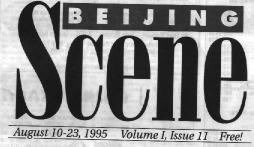 Beijing Scene and DJ Youdai
Beijing Scene and DJ Youdai
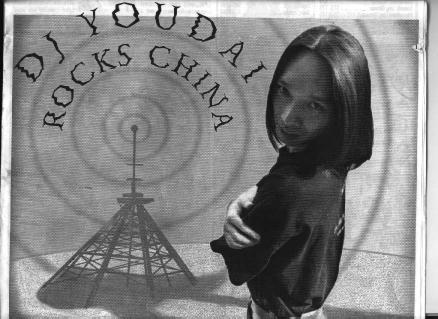
Unfortunately, I didn't find out about DJ Youdai in time to attend one of his music classes, but I was able to listen to his Anyone Can Play Guitar show. He played Joe Satriani for an entire hour. There was very little commentary from Youdai, he just introduced and played the music. Personally, I'm not a big fan of Joe Satriani, but it is definitely Western rock music, and thus a dramatic change from most of the radio programming I heard on other programs. It is worth noting that the only other English music I heard on the radio in China could best be described as "elevator music".
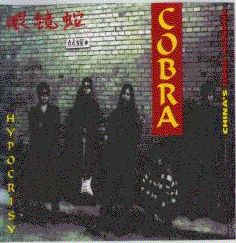 Cobra
Cobra
I really wanted to meet Yu Jin and the rest of the band, but they were very busy with their album and video preparations. When I first spoke with Yu Jin, the band was scheduled to play at a local nightclub, The Poacher's Inn , on the same weekend I planned to be on a train to Shanghai. I changed my travel plans to stay in Beijing through that weekend so that I could hear them perform and meet them after the show, but their concert was postponed at the last minute and I missed them. Before I left Beijing, however, I did manage to buy one of their German-released albums from them. They had a few leftover copies from the supply they were given by their German distributor. Interestingly, I picked up the album (a CD, actually) from another member of the band who was taking an English course at the Poacher's Inn . The owners of the bar were big fans of Cobra , and thus gave them free English lessons each week.
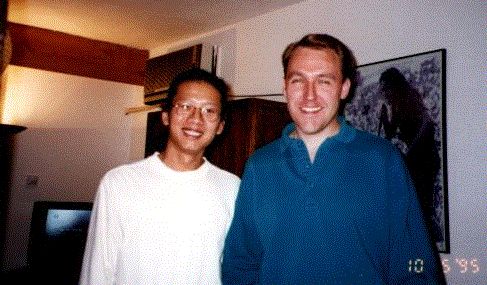
He told me that the first time they tried to have a concert, they almost got arrested by the police. That incident scared them, but didn't stop them from playing music. Their parents didn't want other people to know that they were their children due to their appearance (long hair, weird clothes, etc), but other than that didn't mind too much because they were happy that at least their kids weren't in gangs. He said the long hair and clothes were an attempt to be different, but their choice of rock music was more closely based on what they had heard of Western music. Most of their contact with this kind of music was from attending parties held by foreigners.
He wrote most of the songs that appeared on Cui Jian's first album in the early 1980's, and they soon became rather famous in China. Cui Jian has continued his successful rock career throughout the years, but Wang Xiao Mao lost interest in rock and moved on to other types of music. He said that he continued to write a few other Cui Jian songs after the initial album, but not very many. He feels that the rock music situation in China has improved a lot over the years, but it is still tough. Rock music isn't allowed to be shown on television, although it is occasionally allowed on the radio. He has found that the Americans in Beijing tend to be very interested in local rock music, and they provide most of the support for local bands. He said that his record company tries to avoid rock bands now because these bands tend to have management problems and aren't very stable. Another interesting comment is that foreign bands have less trouble getting permission to play rock music in China because they sing in English, and the government knows that most Chinese don't know English well enough to understand what the musicians are saying. Bands that sing in Chinese, on the other hand, find the situation much more difficult.
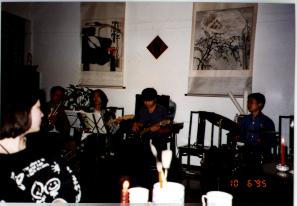
My meeting with Chen Bin was very informative. Although he was not currently in a band, and for all intents and purposes had given up on rock music, he was very well informed about the music situation. He said that he has been in three major Chinese rock music bands, including He Yong and Dou Wei. He was also involved with a punk music band for a while. Overall, however, he felt the rock music scene in Beijing is really bad, and there is no scene outside of Beijing. The problem is that there isn't a big enough market for bands to make a living unless they are really famous. Only a few nightclubs have live music, and most of them don't want bands that play original music. There are so few opportunities for a band to make money that they go broke and break up before they really get a chance to get their acts together. This problem is compounded by a great lack of skilled rock musicians. As a result, virtually all of the current rock musicians know each other well, and tend to sound somewhat alike. The bands also end up having to share some of the same musicians, which is how he was able to be a part of so many relatively famous (I had heard of them) bands.
I also asked him how he sees the situation changing over the next few years. He feels that it will definitely get better, as foreign music becomes more accessible to the average Chinese teenager, and the government eases its controls. He thinks it will take at least 10 years before there is a dramatic improvement, however. My last question was in response to the numerous people who had told me they had "outgrown" rock music. I asked him if he felt rock music is just a phase that kids go through, and (somewhat surprisingly) he said "no". He believes it is a legitimate form of music that will increase in popularity in China, and he was surprised when I told him how many people in China seemed to believe otherwise.
Some clubs in the diplomatic section of Beijing (the SanLiTun area) were closer to what I wanted, but still not very impressive. With only a single exception, all I found were Chinese bands playing covers of old American soft rock songs (sung in English). The exception occurred the very last day I was in Beijing, at a club called "City Pub". A four-member band played the usual collection of old cover tunes, and then everyone but the bass player and drummer packed up and left. The bass player said that he wanted to play some original music and stayed to play four more songs. These songs were original, sung in Chinese, and sounded quite good. Unfortunately, it was apparent that he was doing this on his own, i.e. he got paid for doing the cover songs with the rest of the band, and was doing the original music just because he liked it.
At that same club, a friend and I both recognized one of the waiters. I recognized the waiter from a different club where I had seen him in the band that was performing, and my friend recognized him from a Cui Jian concert she had attended in the United States! We asked him about this, and he told us that he is a musician who occasionally plays at the local clubs with various other area musicians. The group I had seen him with wasn't actually a "band", per se, they just practiced a few songs together so they could play at the club and make some money. He had toured with Cui Jian in a similar capacity: he wasn't a permanent part of Cui Jian's band, he just got to join them for their tour. He told us that there aren't really any clubs that will hire Chinese bands to play original music, so they have to play cover tunes and work at other jobs to make money.
I asked him what he thought about the common use of rock music as a platform for expressing political messages, and his answer was somewhat surprising to me. He said that he thinks it is wrong to do that, because anything he thinks or says is just his opinion, and he shouldn't confuse or mislead other people with his opinions. He thinks that making your music political might "create a lot of problems for kids and particularly the older generation." He also said that he thinks the current music situation in China is just fine, except that it needs more heavy metal music. Interestingly, when I asked him about his favorite bands, he listed bands such as Nirvana and Faith No More that often have very political lyrics. I can only assume that he either doesn't listen to their lyrics carefully, or he hasn't thought through his position very well. After playing for almost an hour, the band took a break. The guitar player was apparently one of Sylvester's friends, so he came over and I was able to talk to him for a while. He told me the group that was playing tonight wasn't really a band, they were just musicians who got together tonight to make some money (just like the waiter/musician I had spoken with in Beijing). In fact, he told me that their lead singer tonight was forced upon them by the government, and that is why he was so bad. Apparently when they apply for a permit to play a concert, the government "encourages" them to hire at least one of their band members from the government's staff of temporary employees. They have to hire him at a fairly expensive rate (since the government gets part of his wages), and thus the government gets an extra cut of the band's income, in addition to the other fees they must pay for the right to play.
He told me that there aren't any places in Shanghai that let bands play original music, and there is only one other place that even lets bands play cover tunes (all the other nightclubs use prerecorded music). The other bar is called "Malone's American Bar," and as the name suggests it caters almost exclusively to Americans and other foreigners. The Super Star Club, in contrast, has a fairly large percentage of (affluent) local clientele. Looking around the room, I did notice that almost half of the people were Chinese, which was a larger percentage than I had noticed at most of the other bars where I had heard live music. He said the music scene is much better in Beijing, but he doesn't want to go there because there is too much competition. Although I didn't find many competing bands when I was in Beijing, I think he meant that there are so few places to play compared to the number of bands, that the bands can't stay busy enough to make a living. He told me that he had been in various other cities, such as Canton, and as a rule they were much worse than even Shanghai.
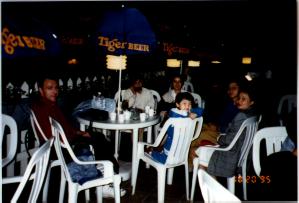
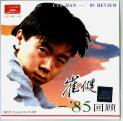 Chinese Prerecorded Music Market
Chinese Prerecorded Music Market
A second, cheaper source of Western music in China is the bootleg CD blackmarket. I was often approached by Chinese men saying "CD? CD?" to ask if I wanted to buy music or computer CD-ROMs. Purely in the interest of research (well, mostly in the interest of research...), I investigated one of these offers and found that it is possible to buy a wide variety of foreign music, including groups such as Abba, Michael Jackson, Sex Pistols, and The Scorpions, for less than US$2 per CD. At these prices, I think Western music is within the budget of many young people in China. If the U.S. succeeds in stopping the music piracy business in China, this situation will clearly change. While that might be a bad thing for the Chinese music scene in the short term, since it would make foreign music more expensive and thus less accessible, I think it would also make China a much more viable market for commercial music of both foreign and local origin. China clearly has a lot of low-cost CD manufacturing facilities, so the only thing they lack is music they can legally put on those CD's. Hopefully Chinese rock musicians will be able to fill this void soon.
I asked some people about the availability of these Hong Kong stations to average Chinese citizens, and was told that it wasn't legal for them to get these stations at home. The government doesn't allow Chinese citizens to own satellite dishes, so they are restricted to local stations that cannot show rock music. Some people own satellite dishes anyway, but they are quite expensive and the owners run the risk of having them confiscated or taxed. I also inquired with the manager of my hotel in Beijing about why his hotel does not have any foreign television stations such as CNN (I asked this shortly after watching the O.J. Simpson verdict announced on Chinese news, in Chinese, and not being able to tell if he was found guilty or not). He told me that hotels such as his, which cater primarily to Chinese people, are not allowed to have English news stations; only the big foreign hotels can have them.